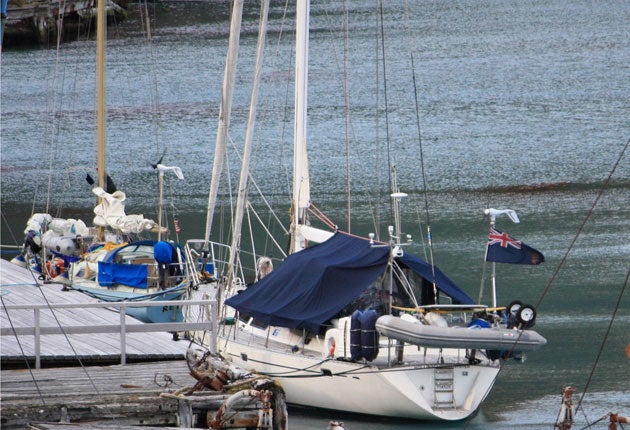Navy rescues family after yacht hits iceberg in Atlantic

Your support helps us to tell the story
From reproductive rights to climate change to Big Tech, The Independent is on the ground when the story is developing. Whether it's investigating the financials of Elon Musk's pro-Trump PAC or producing our latest documentary, 'The A Word', which shines a light on the American women fighting for reproductive rights, we know how important it is to parse out the facts from the messaging.
At such a critical moment in US history, we need reporters on the ground. Your donation allows us to keep sending journalists to speak to both sides of the story.
The Independent is trusted by Americans across the entire political spectrum. And unlike many other quality news outlets, we choose not to lock Americans out of our reporting and analysis with paywalls. We believe quality journalism should be available to everyone, paid for by those who can afford it.
Your support makes all the difference.A family of four had to be rescued by a British warship after their yacht hit an iceberg in the South Atlantic. Carl Lomas and Tracey Worth were sailing with their two daughters when they hit a low-lying iceberg, known as a "growler", 300 miles off the coast of South Georgia in the South Atlantic.
The couple, from Chelmorton, Derbyshire, were sailing to Cape Town with their teenage daughters, Caitland and Morgause Lomas.
Yesterday the family was beginning a week-long 1,000-mile journey to the Falklands after the British warship HMS Clyde picked them up after being alerted to the situation by Falmouth coastguard.
Prospects of saving the yacht – an 18-metre Oyster – which has been the couple's effective home in recent years, are understood to be poor. It suffered engine failure and took in water following the crash.
A coastguard spokesman said: "It (the yacht) was fairly low in the water. Perhaps it will sink."
According to the family's blog, their travels began in March 2007 in Ipswich and have taken in Santander, Cape St Vincent, Salvador, Buenos Aires, Robinson Crusoe Island, Cape Horn, and, recently, South Georgia.
HMS Clyde was 200 miles south of the yacht when the alert was raised at 7pm on Friday. The coastguard spokesman explained: "What they've hit is a 'growler', where hardly anything is out of the water and the majority is submerged. It is very similar to what the Titanic hit."
Steven Gill, who met the couple on their travels, described them as "extremely competent sailors" with a "well-equipped yacht".
Subscribe to Independent Premium to bookmark this article
Want to bookmark your favourite articles and stories to read or reference later? Start your Independent Premium subscription today.
Join our commenting forum
Join thought-provoking conversations, follow other Independent readers and see their replies
Comments